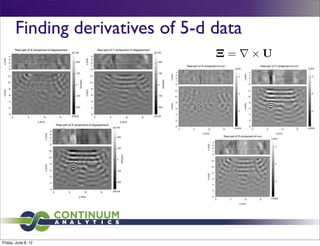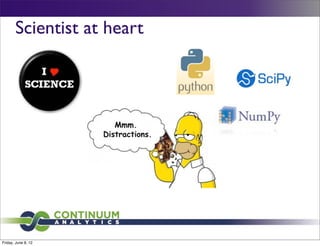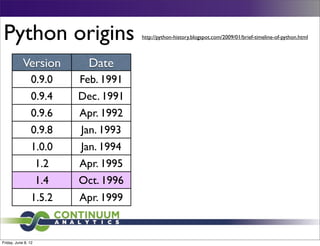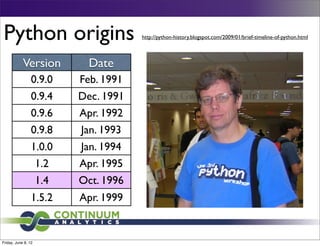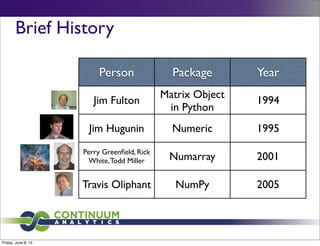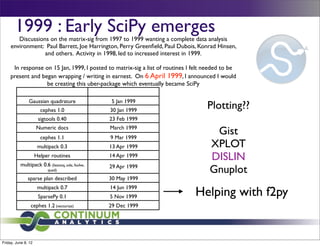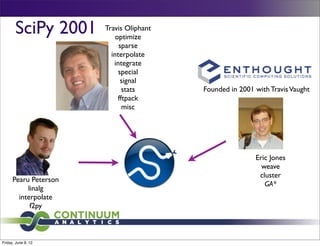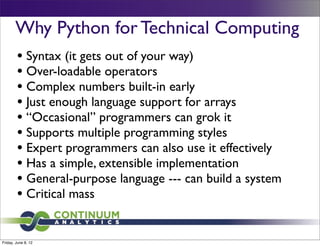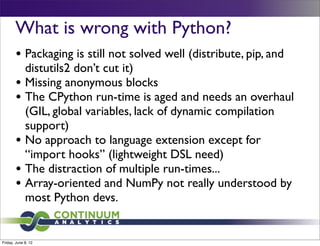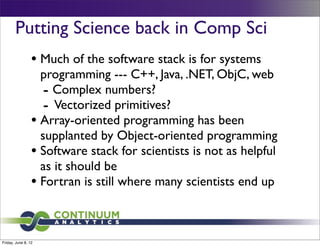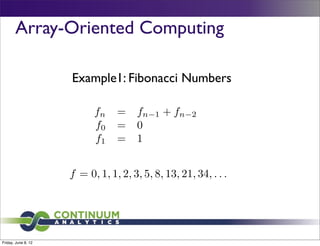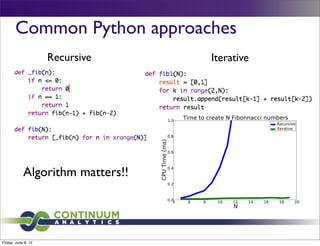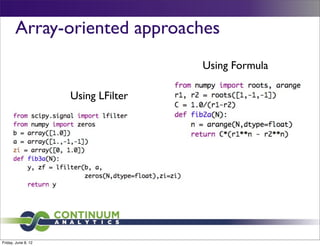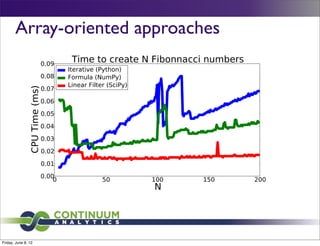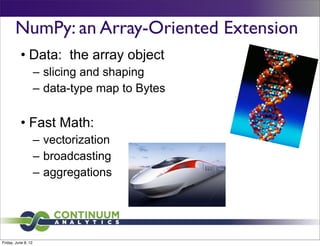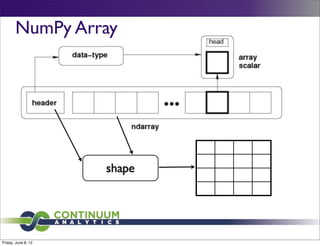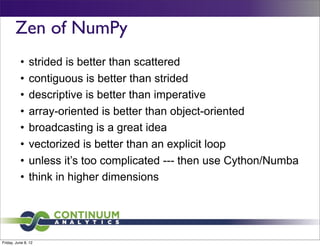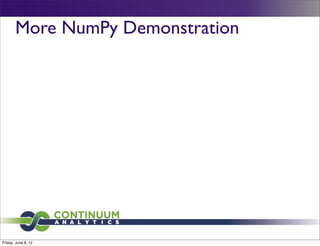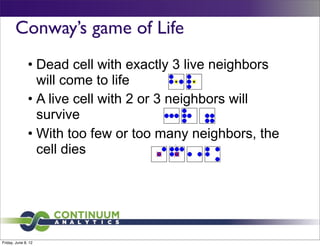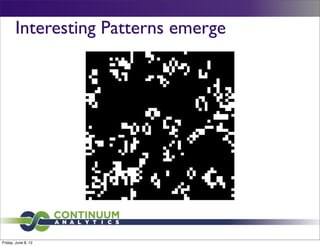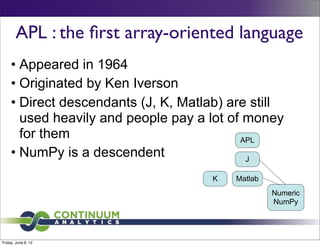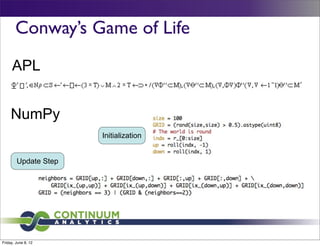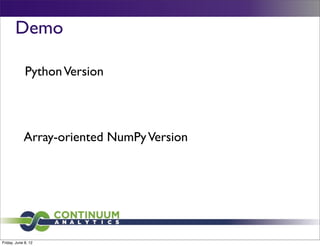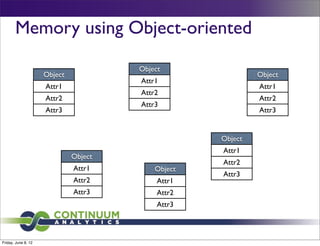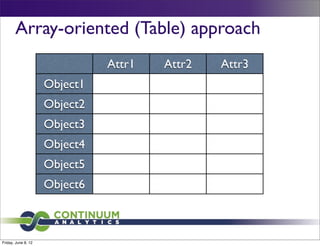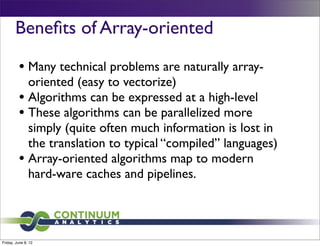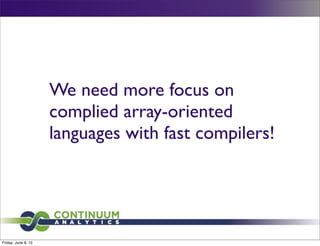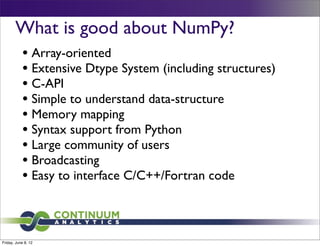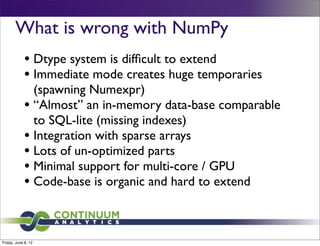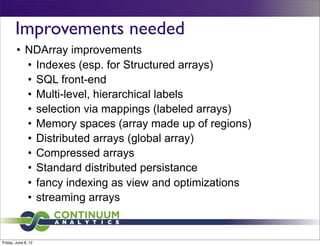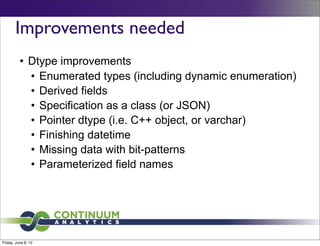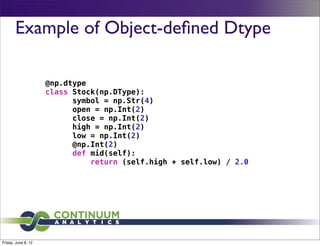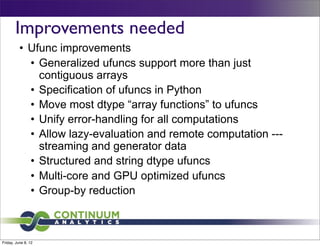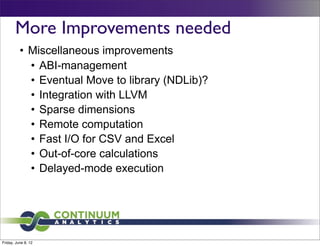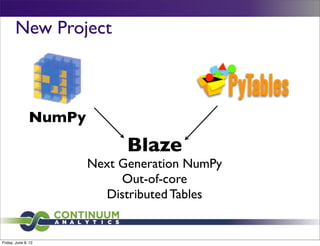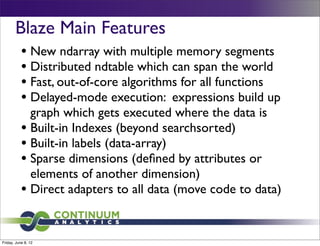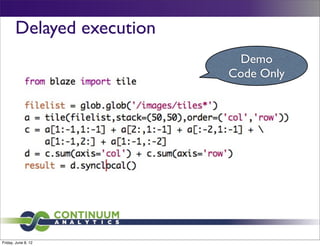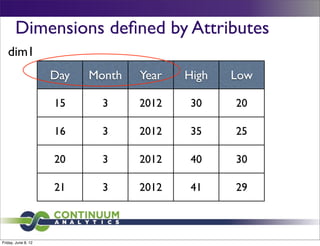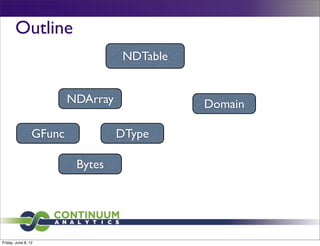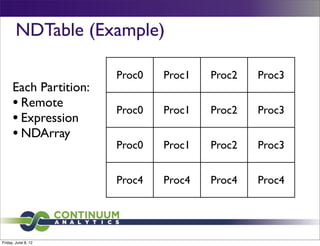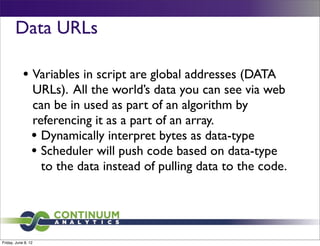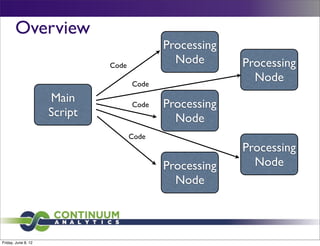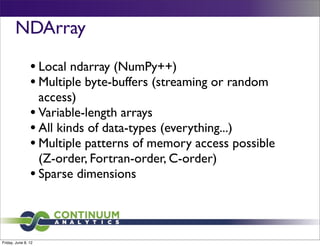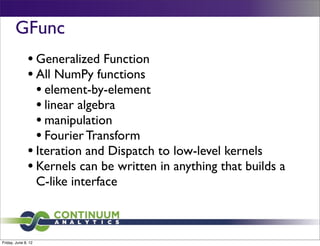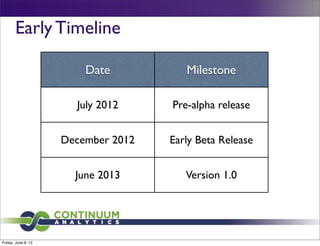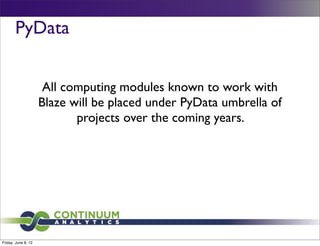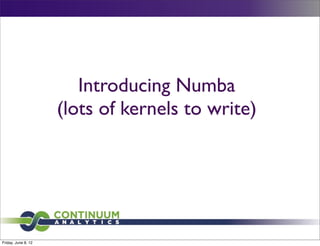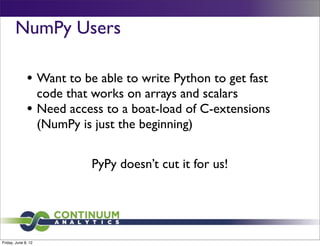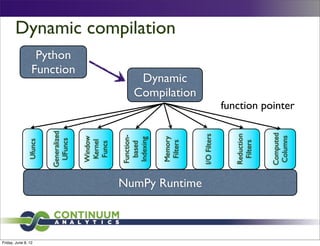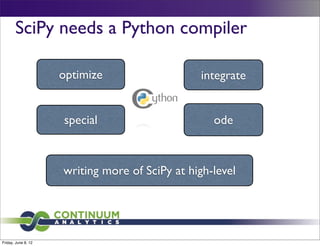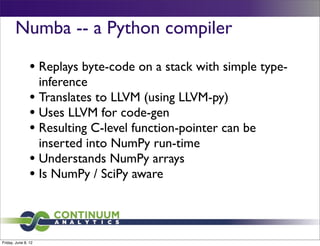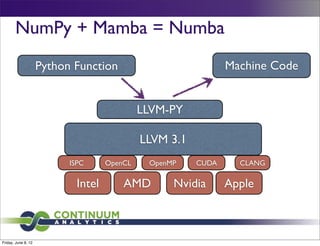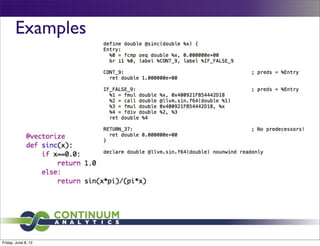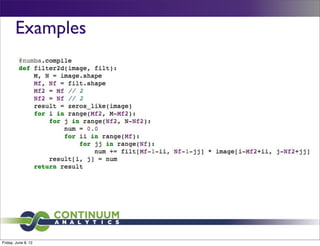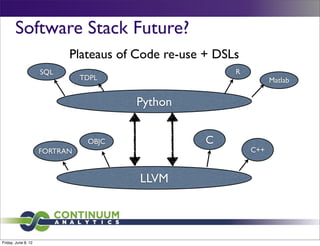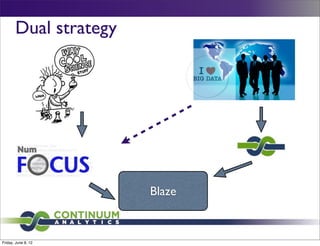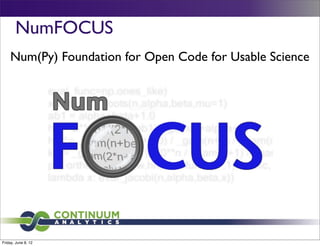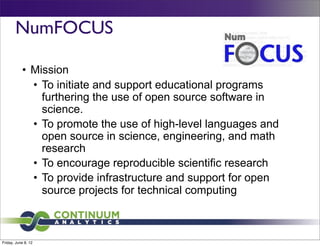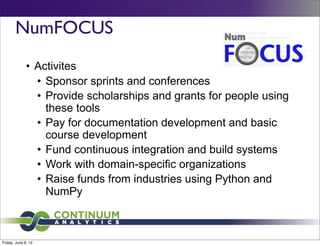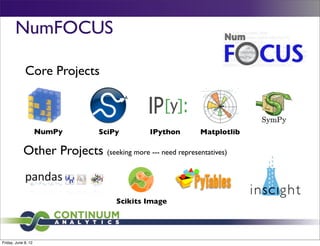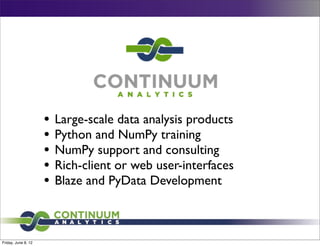Large-scale Array-oriented Computing with Python
- 1. Large-scale array-oriented computing with Python Travis E. Oliphant PyCon Taiwan, June 9, 2012 Friday, June 8, 12
- 2. My Roots Friday, June 8, 12
- 3. My Roots Images from BYU Mers Lab Friday, June 8, 12
- 4. Science led to Python 2 ?0 (2?f ) Ui (a, f ) = [Cijkl (a, f ) Uk,l (a, f )],j Raja Muthupillai Richard Ehman 1997 Armando Manduca Friday, June 8, 12
- 5. Finding derivatives of 5-d data ?=r?U Friday, June 8, 12
- 6. Scientist at heart Friday, June 8, 12
- 7. Python origins. http://python-history.blogspot.com/2009/01/brief-timeline-of-python.html Version Date 0.9.0 Feb. 1991 0.9.4 Dec. 1991 0.9.6 Apr. 1992 0.9.8 Jan. 1993 1.0.0 Jan. 1994 1.2 Apr. 1995 1.4 Oct. 1996 1.5.2 Apr. 1999 Friday, June 8, 12
- 8. Python origins. http://python-history.blogspot.com/2009/01/brief-timeline-of-python.html Version Date 0.9.0 Feb. 1991 0.9.4 Dec. 1991 0.9.6 Apr. 1992 0.9.8 Jan. 1993 1.0.0 Jan. 1994 1.2 Apr. 1995 1.4 Oct. 1996 1.5.2 Apr. 1999 Friday, June 8, 12
- 9. Brief History Person Package Year Matrix Object Jim Fulton 1994 in Python Jim Hugunin Numeric 1995 Perry Green?eld, Rick White, Todd Miller Numarray 2001 Travis Oliphant NumPy 2005 Friday, June 8, 12
- 10. 1999 : Early SciPy emerges Discussions on the matrix-sig from 1997 to 1999 wanting a complete data analysis environment: Paul Barrett, Joe Harrington, Perry Green?eld, Paul Dubois, Konrad Hinsen, and others. Activity in 1998, led to increased interest in 1999. In response on 15 Jan, 1999, I posted to matrix-sig a list of routines I felt needed to be present and began wrapping / writing in earnest. On 6 April 1999, I announced I would be creating this uber-package which eventually became SciPy Gaussian quadrature 5 Jan 1999 cephes 1.0 30 Jan 1999 Plotting?? sigtools 0.40 23 Feb 1999 Numeric docs cephes 1.1 March 1999 9 Mar 1999 Gist multipack 0.3 13 Apr 1999 XPLOT Helper routines 14 Apr 1999 DISLIN multipack 0.6 (leastsq, ode, fsolve, quad) 29 Apr 1999 Gnuplot sparse plan described 30 May 1999 multipack 0.7 SparsePy 0.1 14 Jun 1999 5 Nov 1999 Helping with f2py cephes 1.2 (vectorize) 29 Dec 1999 Friday, June 8, 12
- 11. SciPy 2001 Travis Oliphant optimize sparse interpolate integrate special signal stats Founded in 2001 with Travis Vaught fftpack misc Eric Jones weave cluster Pearu Peterson GA* linalg interpolate f2py Friday, June 8, 12
- 12. Community effort ? Chuck Harris ? Pauli Virtanen ? David Cournapeau ? Stefan van der Walt ? Dag Sverre Seljebotn ? Robert Kern ? Warren Weckesser ? Ralf Gommers ? Mark Wiebe ? Nathaniel Smith Friday, June 8, 12
- 13. Why Python for Technical Computing ? Syntax (it gets out of your way) ? Over-loadable operators ? Complex numbers built-in early ? Just enough language support for arrays ? Ī░OccasionalĪ▒ programmers can grok it ? Supports multiple programming styles ? Expert programmers can also use it effectively ? Has a simple, extensible implementation ? General-purpose language --- can build a system ? Critical mass Friday, June 8, 12
- 14. What is wrong with Python? ? Packaging is still not solved well (distribute, pip, and distutils2 donĪ»t cut it) ? Missing anonymous blocks ? The CPython run-time is aged and needs an overhaul (GIL, global variables, lack of dynamic compilation support) ? No approach to language extension except for Ī░import hooksĪ▒ (lightweight DSL need) ? The distraction of multiple run-times... ? Array-oriented and NumPy not really understood by most Python devs. Friday, June 8, 12
- 15. Putting Science back in Comp Sci ? Much of the software stack is for systems programming --- C++, Java, .NET, ObjC, web - Complex numbers? - Vectorized primitives? ? Array-oriented programming has been supplanted by Object-oriented programming ? Software stack for scientists is not as helpful as it should be ? Fortran is still where many scientists end up Friday, June 8, 12
- 16. Array-Oriented Computing Example1: Fibonacci Numbers fn = fn 1 + fn 2 f0 = 0 f1 = 1 f = 0, 1, 1, 2, 3, 5, 8, 13, 21, 34, . . . Friday, June 8, 12
- 17. Common Python approaches Recursive Iterative Algorithm matters!! Friday, June 8, 12
- 18. Array-oriented approaches Using Formula Using LFilter Friday, June 8, 12
- 19. Array-oriented approaches Friday, June 8, 12
- 20. NumPy: an Array-Oriented Extension ? Data: the array object ©C slicing and shaping ©C data-type map to Bytes ? Fast Math: ©C vectorization ©C broadcasting ©C aggregations Friday, June 8, 12
- 21. NumPy Array shape Friday, June 8, 12
- 22. Zen of NumPy ? strided is better than scattered ? contiguous is better than strided ? descriptive is better than imperative ? array-oriented is better than object-oriented ? broadcasting is a great idea ? vectorized is better than an explicit loop ? unless itĪ»s too complicated --- then use Cython/Numba ? think in higher dimensions Friday, June 8, 12
- 23. More NumPy Demonstration Friday, June 8, 12
- 24. ConwayĪ»s game of Life ? Dead cell with exactly 3 live neighbors will come to life ? A live cell with 2 or 3 neighbors will survive ? With too few or too many neighbors, the cell dies Friday, June 8, 12
- 25. Interesting Patterns emerge Friday, June 8, 12
- 26. APL : the ?rst array-oriented language ? Appeared in 1964 ? Originated by Ken Iverson ? Direct descendants (J, K, Matlab) are still used heavily and people pay a lot of money for them APL ? NumPy is a descendent J K Matlab Numeric NumPy Friday, June 8, 12
- 27. ConwayĪ»s Game of Life APL NumPy Initialization Update Step Friday, June 8, 12
- 28. Demo Python Version Array-oriented NumPy Version Friday, June 8, 12
- 29. Memory using Object-oriented Object Object Object Attr1 Attr1 Attr1 Attr2 Attr2 Attr2 Attr3 Attr3 Attr3 Object Attr1 Object Attr2 Attr1 Object Attr3 Attr2 Attr1 Attr3 Attr2 Attr3 Friday, June 8, 12
- 30. Array-oriented (Table) approach Attr1 Attr2 Attr3 Object1 Object2 Object3 Object4 Object5 Object6 Friday, June 8, 12
- 31. Bene?ts of Array-oriented ? Many technical problems are naturally array- oriented (easy to vectorize) ? Algorithms can be expressed at a high-level ? These algorithms can be parallelized more simply (quite often much information is lost in the translation to typical Ī░compiledĪ▒ languages) ? Array-oriented algorithms map to modern hard-ware caches and pipelines. Friday, June 8, 12
- 32. We need more focus on complied array-oriented languages with fast compilers! Friday, June 8, 12
- 33. What is good about NumPy? ? Array-oriented ? Extensive Dtype System (including structures) ? C-API ? Simple to understand data-structure ? Memory mapping ? Syntax support from Python ? Large community of users ? Broadcasting ? Easy to interface C/C++/Fortran code Friday, June 8, 12
- 34. What is wrong with NumPy ? Dtype system is dif?cult to extend ? Immediate mode creates huge temporaries (spawning Numexpr) ? Ī░AlmostĪ▒ an in-memory data-base comparable to SQL-lite (missing indexes) ? Integration with sparse arrays ? Lots of un-optimized parts ? Minimal support for multi-core / GPU ? Code-base is organic and hard to extend Friday, June 8, 12
- 35. Improvements needed ? NDArray improvements ? Indexes (esp. for Structured arrays) ? SQL front-end ? Multi-level, hierarchical labels ? selection via mappings (labeled arrays) ? Memory spaces (array made up of regions) ? Distributed arrays (global array) ? Compressed arrays ? Standard distributed persistance ? fancy indexing as view and optimizations ? streaming arrays Friday, June 8, 12
- 36. Improvements needed ? Dtype improvements ? Enumerated types (including dynamic enumeration) ? Derived fields ? Specification as a class (or JSON) ? Pointer dtype (i.e. C++ object, or varchar) ? Finishing datetime ? Missing data with bit-patterns ? Parameterized field names Friday, June 8, 12
- 37. Example of Object-de?ned Dtype @np.dtype class Stock(np.DType): symbol = np.Str(4) open = np.Int(2) close = np.Int(2) high = np.Int(2) low = np.Int(2) @np.Int(2) def mid(self): return (self.high + self.low) / 2.0 Friday, June 8, 12
- 38. Improvements needed ? Ufunc improvements ? Generalized ufuncs support more than just contiguous arrays ? Specification of ufuncs in Python ? Move most dtype Ī░array functionsĪ▒ to ufuncs ? Unify error-handling for all computations ? Allow lazy-evaluation and remote computation --- streaming and generator data ? Structured and string dtype ufuncs ? Multi-core and GPU optimized ufuncs ? Group-by reduction Friday, June 8, 12
- 39. More Improvements needed ? Miscellaneous improvements ? ABI-management ? Eventual Move to library (NDLib)? ? Integration with LLVM ? Sparse dimensions ? Remote computation ? Fast I/O for CSV and Excel ? Out-of-core calculations ? Delayed-mode execution Friday, June 8, 12
- 40. New Project NumPy Blaze Next Generation NumPy Out-of-core Distributed Tables Friday, June 8, 12
- 41. Blaze Main Features ? New ndarray with multiple memory segments ? Distributed ndtable which can span the world ? Fast, out-of-core algorithms for all functions ? Delayed-mode execution: expressions build up graph which gets executed where the data is ? Built-in Indexes (beyond searchsorted) ? Built-in labels (data-array) ? Sparse dimensions (de?ned by attributes or elements of another dimension) ? Direct adapters to all data (move code to data) Friday, June 8, 12
- 42. Delayed execution Demo Code Only Friday, June 8, 12
- 43. Dimensions de?ned by Attributes dim1 Day Month Year High Low 15 3 2012 30 20 16 3 2012 35 25 20 3 2012 40 30 21 3 2012 41 29 Friday, June 8, 12
- 44. Outline NDTable NDArray Domain GFunc DType Bytes Friday, June 8, 12
- 45. NDTable (Example) Proc0 Proc1 Proc2 Proc3 Each Partition: ? Remote Proc0 Proc1 Proc2 Proc3 ? Expression ? NDArray Proc0 Proc1 Proc2 Proc3 Proc4 Proc4 Proc4 Proc4 Friday, June 8, 12
- 46. Data URLs ? Variables in script are global addresses (DATA URLs). All the worldĪ»s data you can see via web can be in used as part of an algorithm by referencing it as a part of an array. ? Dynamically interpret bytes as data-type ? Scheduler will push code based on data-type to the data instead of pulling data to the code. Friday, June 8, 12
- 47. Overview Processing Code Node Processing Code Node Main Code Processing Script Node Code Processing Processing Node Node Friday, June 8, 12
- 48. NDArray ? Local ndarray (NumPy++) ? Multiple byte-buffers (streaming or random access) ? Variable-length arrays ? All kinds of data-types (everything...) ? Multiple patterns of memory access possible (Z-order, Fortran-order, C-order) ? Sparse dimensions Friday, June 8, 12
- 49. GFunc ? Generalized Function ? All NumPy functions ? element-by-element ? linear algebra ? manipulation ? Fourier Transform ? Iteration and Dispatch to low-level kernels ? Kernels can be written in anything that builds a C-like interface Friday, June 8, 12
- 50. Early Timeline Date Milestone July 2012 Pre-alpha release December 2012 Early Beta Release June 2013 Version 1.0 Friday, June 8, 12
- 51. PyData All computing modules known to work with Blaze will be placed under PyData umbrella of projects over the coming years. Friday, June 8, 12
- 52. Introducing Numba (lots of kernels to write) Friday, June 8, 12
- 53. NumPy Users ? Want to be able to write Python to get fast code that works on arrays and scalars ? Need access to a boat-load of C-extensions (NumPy is just the beginning) PyPy doesnĪ»t cut it for us! Friday, June 8, 12
- 54. Friday, June 8, 12 Ufuncs Generalized UFuncs Python Function Window Kernel Funcs Function- based Indexing Memory Dynamic compilation Filters Dynamic Compilation NumPy Runtime I/O Filters Reduction Filters Computed Columns function pointer
- 55. SciPy needs a Python compiler optimize integrate special ode writing more of SciPy at high-level Friday, June 8, 12
- 56. Numba -- a Python compiler ? Replays byte-code on a stack with simple type- inference ? Translates to LLVM (using LLVM-py) ? Uses LLVM for code-gen ? Resulting C-level function-pointer can be inserted into NumPy run-time ? Understands NumPy arrays ? Is NumPy / SciPy aware Friday, June 8, 12
- 57. NumPy + Mamba = Numba Python Function Machine Code LLVM-PY LLVM 3.1 ISPC OpenCL OpenMP CUDA CLANG Intel AMD Nvidia Apple Friday, June 8, 12
- 58. Examples Friday, June 8, 12
- 59. Examples Friday, June 8, 12
- 60. Software Stack Future? Plateaus of Code re-use + DSLs SQL R TDPL Matlab Python OBJC C FORTRAN C++ LLVM Friday, June 8, 12
- 61. How to pay for all this? Friday, June 8, 12
- 62. Dual strategy Blaze Friday, June 8, 12
- 63. NumFOCUS Num(Py) Foundation for Open Code for Usable Science Friday, June 8, 12
- 64. NumFOCUS ? Mission ? To initiate and support educational programs furthering the use of open source software in science. ? To promote the use of high-level languages and open source in science, engineering, and math research ? To encourage reproducible scientific research ? To provide infrastructure and support for open source projects for technical computing Friday, June 8, 12
- 65. NumFOCUS ? Activites ? Sponsor sprints and conferences ? Provide scholarships and grants for people using these tools ? Pay for documentation development and basic course development ? Fund continuous integration and build systems ? Work with domain-specific organizations ? Raise funds from industries using Python and NumPy Friday, June 8, 12
- 66. NumFOCUS Core Projects NumPy SciPy IPython Matplotlib Other Projects (seeking more --- need representatives) Scikits Image Friday, June 8, 12
- 67. NumFOCUS ? Directors ? Perry Greenfield ? John Hunter ? Jarrod Millman ? Travis Oliphant ? Fernando Perez ? Members ? Basically people who donate for now. In time, a body that elects directors. Friday, June 8, 12
- 68. ? Large-scale data analysis products ? Python and NumPy training ? NumPy support and consulting ? Rich-client or web user-interfaces ? Blaze and PyData Development Friday, June 8, 12

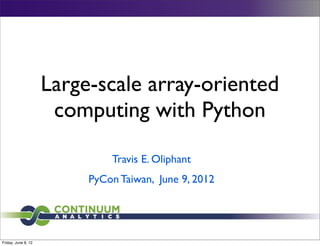
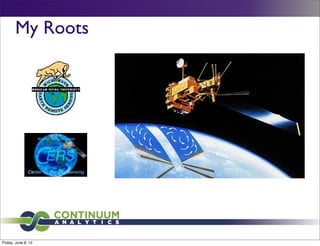
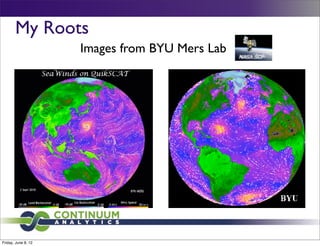
![Science led to Python
2
?0 (2?f ) Ui (a, f ) = [Cijkl (a, f ) Uk,l (a, f )],j
Raja Muthupillai
Richard Ehman
1997
Armando Manduca
Friday, June 8, 12](https://image.slidesharecdn.com/largescalearrayorientedcomputingwithpython-travisoliphant-120609201033-phpapp02/85/Large-scale-Array-oriented-Computing-with-Python-4-320.jpg)
